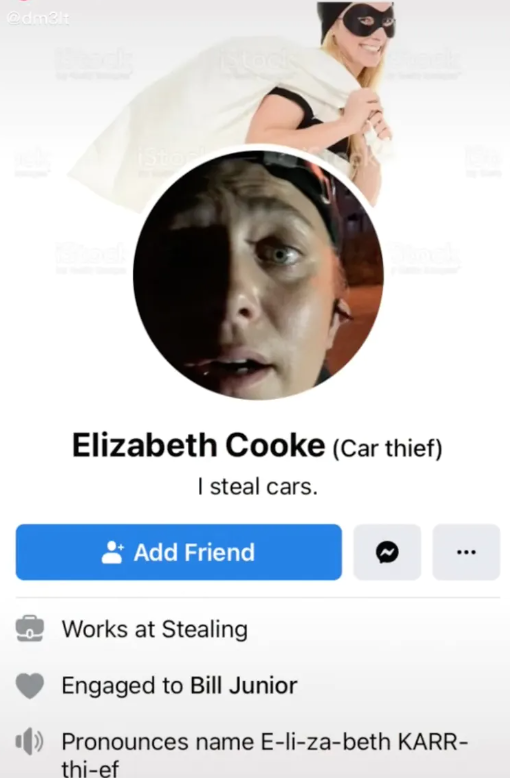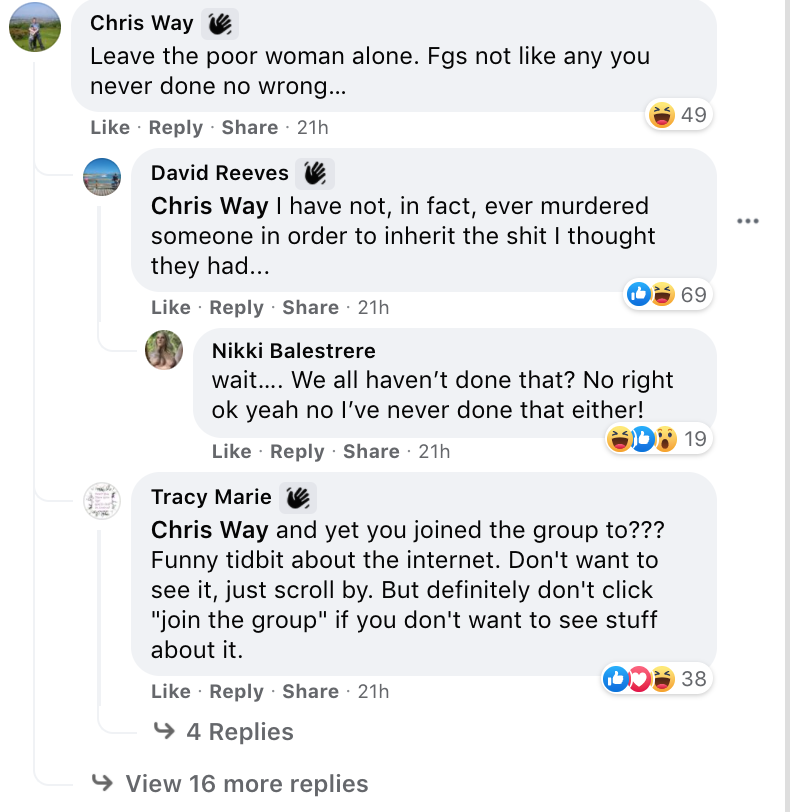A thief left her phone at the scene. The victim took over her social media, sparking a wild internet-sleuthing saga

- In August, a 35-year-old woman named Elizabeth Cooke was caught on camera breaking into a car in St. Louis.
- The car owner gained access to a phone she left at the scene. In addition to taking over her social media, he found evidence suggesting that she and others had been committing crimes around the area, as well as information on the death of a local man named Bobby Phillips.
- Thousands on social media have been investigating the case, including one St. Louis man whose popular Facebook group may serve as a model for how communities can use social media to take a proactive stance against crime.
On August 4, 35-year-old Elizabeth Cooke walked down a dark street in south St. Louis and broke into a 1996 Jeep Grand Cherokee. Then she heard the car owner approach. He recorded the confrontation on his phone.
“The f***?” he says.
“I’m so sorry, is this not my car?” she says, after telling him a friend said that she could use the car.
The owner doesn’t believe her.
“You’re out here f***in’ breakin’ my [steering] column down,” he says later in the video.
It would have been a good time for Cooke to leave the scene. But she had left some of her belongings in the Jeep and the owner refused to let her back inside to get them. Cooke pleaded with him. He refused.
“Call the police!” he suggests.
Cooke walked away without the Jeep and without one of her own possessions: her phone. Days later, videos of the botched theft appeared online. The videos were posted to Cooke’s Facebook account — not by her, but by the owner of the Jeep, a St. Louis man who wishes to remain anonymous but goes by the pseudonym Jeff.
Jeff said he gained access to Cooke’s phone with help from her fiance.
“And what I did is I took as much information as I could out of it,” Jeff told St. Louis’ Riverfront Times. “And then, when her sister said that the phone was reported stolen, I went ahead and I made sure I had access to everything, and handed it over to the police, because I didn’t want to be in possession of stolen property.”
Jeff soon began posting more of Cooke’s content — messages, videos, Google searches — to social media. The content revealed the communications of a small network of criminals across the St. Louis area who seemed to have engaged in looting storage lockers, stealing cars, and potentially robbing the homes of the recently deceased.
The story went viral. What has since unfolded online has captivated tens of thousands of people in the St. Louis area and beyond, resulting in a wild mix of comedy, controversy, and groups of internet sleuths who are trying to use the content to solve other crimes potentially committed by Cooke and her associates. The most serious of those crimes, according to some members of the groups, involves the death of a 62-year-old man.
Upending an online persona
After gaining access to Cooke’s phone, Jeff began changing her Facebook profile. He listed her name as “Elizabeth Cooke (Car Thief)” with the pronunciation“KARR-thi-ef.” He updated her background photo to a stock image of a grinning woman wearing a thief costume. And he changed her job to “works at Stealing.”
Hundreds of people started following the account. Strangers following the story on Facebook and TikTok generally found it amusing. Cooke’s Facebook friends seemed to be confused, angry, or disappointed with her; one friend who appeared to have conspired with Cooke to steal cars was panicked. Cooke herself seemed to briefly appear in the comments on another account. Facebook eventually shut down the page.

But Jeff also had control of Cooke’s YouTube account. On August 9, he began posting videos showing, among other things, text conversations between Cooke and friends that appear to implicate them in a range of property crimes. A Google search in one video reads: “How to steal a Honda Accord.” Another shows a conversation in which Cooke’s account tells a friend: “I only have a stolo that I’m not comfortable driving.” And some of the videos suggest Cooke and her associates were stealing property from storage units.
The death of Bobby Phillips
The story took a darker turn. On August 11, Jeff posted several videos that were recorded on Cooke’s phone on January 1, 2021. That was the day a 62-year-old man named Bobby Phillips died in a home where Cooke and others were staying. The St. Louis City Medical Examiner’s office had ruled the death an accident, noting that he had an underlying heart condition that was exacerbated by methamphetamines.
It’s not shocking that a man who had heart problems and had used meth might die at age 62. But what sparked suspicion among some people — both at the time of Phillips’ death and after Jeff started posting content — were the events in the last week of December 2020.
Phillips died two days after naming Cooke as the sole beneficiary in his will and giving her power of attorney. According to a video recorded by Cooke, she met Phillips within a week before his death; a Facebook account under the name Bobby Phillips was created within that week and listed Cooke as his only friend. In a text conversation between Cooke and a friend, uploaded to YouTube by Jeff, she said Phillips “left me a lawsuit worth 1.7 million dollars.”
Early on New Year’s Day, medics arrived at the house where Cooke, Phillips, and others were staying and detected that Phillips had a faint pulse. They tried to save his life. But Cooke ordered them to stop, producing paperwork that showed she had power of attorney and insisted that Phillips didn’t wish to be resuscitated.
(The police and the medical examiner did not find signs of drugs or trauma on Phillips’ body. Cooke was arrested for meth possession and stolen vehicle charges in August. Content uploaded by Jeff shows she had discussed meth multiple times in text conversations, including one in which a friend bragged that he had discovered a “new way” to smoke meth. )
The strange timing of his death has pushed thousands of people down the rabbit hole of the Elizabeth Cooke story. Between two main Facebook groups — the Elizabeth Cooke Corkboard and the Elizabeth Cooke crimes STL corkboard — they have been attempting to help recover stolen property, identify potential suspects, and uncover more details about the death of Bobby Phillips.
The investigations — both official and unofficial — are ongoing. It is unclear what, if anything, they might uncover, or whether anybody else will be charged with crimes related to thefts or the death of Bobby Phillips. The uncertainty stems partly from the fact that Cooke’s phone contained a ton of content that Jeff is still sorting through with the help of a few people working with him.
One is Brock Schmittler, the administrator of the Elizabeth Cooke crimes STL corkboard.
“There’s a lot of things we can’t say yet publicly, not because of production value or any of this shit, just because there’s peoples’ real lives at stake,” Schmittler said. “It turns out that some of [Cooke’s associates] are like, you know, more nutty than you’d like them to be.”
The Elizabeth Cooke case is not Schmittler’s first foray into using social media to help improve conditions in the area. He has spent years helping build an online network that crowdsources input from locals to help solve crimes and, more generally, fill in the gaps where local police and government fall short.
It is a unique — and often effective — form of a neighbor-watch group that could serve a model for other communities that are struggling with poverty, high crime rates, and apathetic or incompetent law enforcement.
Only in Lemay
Soon after Jeff gained access to Cooke’s phone, he reached out to Schmittler for advice on how to start publishing content. Schmittler was the go-to guy for that sort of thing. Since 2015, he has been administering a page called Only in Lemay, named after the community where he lives — just south of St. Louis City where crime and poverty rates run relatively high.
Similar to the Elizabeth Cooke crimes STL corkboard, Only in Lemay focuses on solving local crimes, returning stolen property to its rightful owners, and encouraging people to take a proactive role in improving their community. Shaming criminals is part of the formula: the page regularly posts mugshots of local criminals and calls out people who have been spotted committing crimes in the area — not small crimes like drug use, but rather things like theft and robbery.
“We’re assholes, but we care. You don’t have to like how we do it,” reads the page description, which notes that Lemay is a beautiful city but has its share of issues. “We want our community better, and there’s a good chance that we’re totally sick of shit like being stolen from, our neighborhood decaying, and the drugs running rampant, so stop doing stupid shit and we’ll stop pointing it out.”
To the people who dislike the approach or get embarrassed when their friends or family get called out:
“Save the crying for someone who gives a shit. Really.”
The group has produced tangible results. Schmittler recalled a case in which a man had been robbing stores on a moped in the area. Only in Lemay members figured out who the suspect was and published his identity.
“We put out the info, we put out his mugshot, we put out everything about him,” he said. “It took about six minutes to locate, find, and get this guy arrested.”
“No snitching” culture
It was both effective and controversial. Critics accused Only in Lemay of snitching, and around the neighborhood some people Schmittler knew started acting differently around him, doing things like hiding a joint whenever he would come around. He said that when you grow up in a place like Lemay you are “taught that you don’t say things, you don’t point people out.”
He rejected that mentality.
“I was like, ‘Okay, you all want to call me a snitch, then f*** it, we snitch,’” Schmittler said. “I don’t know what it takes to clean up the community, but obviously we have a void between police and actually investigating crimes.”
That void is mostly fueled by income. Schmittler said that when you call 911 in a high-income neighborhood around St. Louis, the police show up quickly and treat the caller with respect, assuming they are a victim of a crime. But when you call 911 in places like Lemay, cops often assume everyone is a suspect when they show up.
“If you’ve got the money to defend yourself from the system, then it works,” Schmittler said. “It’ll work for you, even with you. The same thing is applicable for the police.”
After early successes, Schmittler and other Only in Lemay members continued to compile evidence on local crimes and take it to the police. But Schmittler said those efforts were met by a “level of [police] almost ignoring the issue” in a way that was “kind of leaving the people exposed.”
Some of that exposure exists by design. The St. Louis Metropolitan Police Department has a “call reduction initiative,” through which 911 calls are given lower priority if they concern crimes like property destruction or auto theft. For these calls, officers do not show up at the crime scene, but they might give you a call back.

Still, there is no strong anti-cop sentiment in Only in Lemay. Schmittler said some of his friends are cops, and communities need some level of policing — it is just that police should not be “road pirates.” As long as policing disparities persist, Schmittler sees a need for community-led efforts to fill in the gaps.
“That’s the whole reason why I keep doing this shit,” he said. “I’m a firm believer that you just gotta put your best foot forward. You can’t change anybody, like forcefully, or even convincingly, unless you’re doing that shit that you’re talking about yourself. Lead by example.”
Schmittler said Only in Lemay has changed some peoples’ minds on standing up to local crime.
“[They see I] can literally stand up and, like, shit on the criminal population in south St. Louis, and no one’s murdered him yet — keyword yet,” Schmittler said.
A distinct model for neighborhood watch groups
Online neighborhood watch groups are nothing new. The more recent iterations include apps like Citizen and Nextdoor, which allow people to communicate with their neighbors and report crimes. Schmittler understands why these apps exist. “At a certain point, citizens realize that we really don’t have any protection or other options,” he said.
But those apps come with their own problems. One is the types of conversations that often emerge on the apps, such as people being petty, racist, or officious. “What you end up with is a bunch of Karens and Kyles bitching at each other about bitching at each other,” he said. Another problem with those apps — or any smaller-scale online community group — is that it can be dangerous to call out criminals, not to mention attempt to retrieve stolen property.
“[Only in Lemay] actually has people with enough balls to actually just go get their shit back, and we’ll help them,” he said. “It’s effective. That’s the difference.”
Another difference is the page’s comedy, which leans toward memes, crude humor, and, occasionally, trolling. Schmittler said it is a way to get eyes on the group and get people involved. Some members wish the page focused only on community issues. But, “Let’s be honest,” Schmittler said, “f*** Nextdoor because it’s non-stop community” issues.
“I like to laugh, so my approach is a comedic one. It’s just easy to do because all you have to do is tell the truth and the truth is so obscene that it’s funny.”
To be sure, there are other aspects to Only in Lemay beyond crime and comedy. The page also organizes trash and syringe clean-ups and “truck-or-treat” Halloween events for the kids and promotes fundraisers for local organizations and causes.
But in recent weeks, the Elizabeth Cooke case has been taking up more of Schmittler’s time. He considers the Elizabeth Cooke crimes STL corkboard to be a sort of extension of Only in Lemay. It has mostly been “a bit of shitshow and a dumpster fire.” Many members are not interested in helping to solve the crimes or unearth new information. Others have grown bored with the story. But some members have helped bring new information to light — even non-locals.
“People have absolutely pointed things out” from outside of St. Louis. “They notice different things than you do. […] The more eyes [you have] the more successful you’re going to be.”
Ultimately, Schmittler said the most positive thing that has come out of the corkboard — which currently has about 29,500 members — is the network of people.
“Communities gotta work together to solve these problems,” Schmittler said. “[Only in Lemay] is a great example. The [Cooke corkboard] is an even bigger example, because, you know, you can work on things you’re not even close to. You can make a difference. Get involved. Stand up. Do something. Be heard.”
Elizabeth Cooke and public shaming
Jeff and Schmittler have access to virtually all of the content that was on Cooke’s phone when she left it at the crime scene. Most of what they have published involves correspondence between Cooke and her associates that seems related to crimes committed — or at least plotted — around the St. Louis area.
As with Only in Lemay, however, not everyone agrees with the ways Jeff and Schmittler have chosen to publish Cooke’s content. One is Elizabeth Cooke’s father Ken Cooke, who told the St. Louis Post-Dispatch: “What she did was wrong. We don’t condone that at all. But she don’t deserve what [Jeff is] doing.”
Others have said the focus should not be on Cooke herself but on the systemic problems that can lead people into the criminal lifestyle, like addiction, mental health, and poverty. Schmittler acknowledged that “Elizabeth Cooke was probably a normal person at one time, and then through drugs and mental health issues,” she ended up on the wrong path.

But he cautioned against feeling too sorry for her.
“She could’ve stopped this at any time,” he said. “She f***ing 100% deserves everything she gets.”
I asked Schmittler whether their publishing decisions have been guided by a moral principle — a line they are trying not to cross.
“If [Jeff] would have shared her nudes, or her private messages” involving her family, that would have been “truly crossing a line” to the point where she “might be called a victim.” Until that line is crossed, Schmittler said Cooke and the critics “need to shut the f*** up because they’re embarrassing themselves, as far as I’m concerned.”
To Schmittler, if you commit crimes against your community, information on those crimes should fall within the public domain, embarrassing or not.
“The line would be only exposing the people for the shitty things they’ve done,” Schmittler said. “That’s the line. And if people want to avoid that shit, then don’t put yourself in that situation.”
Between the suspicious circumstances of Bobby Phillips’ death and the apparent criminal network illuminated by the content Jeff has uploaded, Schmittler said the story is far from over. As for how he would like to see it end:
“I’d like to see Bobby Phillips get justice. I’d like to see his remains returned to his daughter. And I’d like to see the people responsible for his death — either through planning or helping cover it up, and the people who ignored it — held responsible. And I’d like there to be changes made to prevent another Bobby Philips from occurring.”
In the meantime, Schmittler hopes the story can shine a light on broader issues, like the lack of police protection in lower-income neighborhoods.
“I think that if we can get the community to come together that we can actually address these issues,” he said. “But we need the community to come together. We need everybody to get together on a similar idea that we’re not being protected no matter really who you are, unless you’re in an affluent neighborhood.”
Schmittler sometimes doubts whether he is the right person to run pages like Only in Lemay and the Elizabeth Cooke crimes STL corkboard. But he is confident in the groups’ overall message of encouraging people to start improving their communities from the ground up.
“It just involves people actually breaking their stupor,” he said. “You’re not a cog, man. You’re a f***in’ human and you can make a difference — insignificant as it may be to the nihilists involved, it makes a difference today, and that’s really the only f***in’ difference you need. Today’s the only thing we got.”





